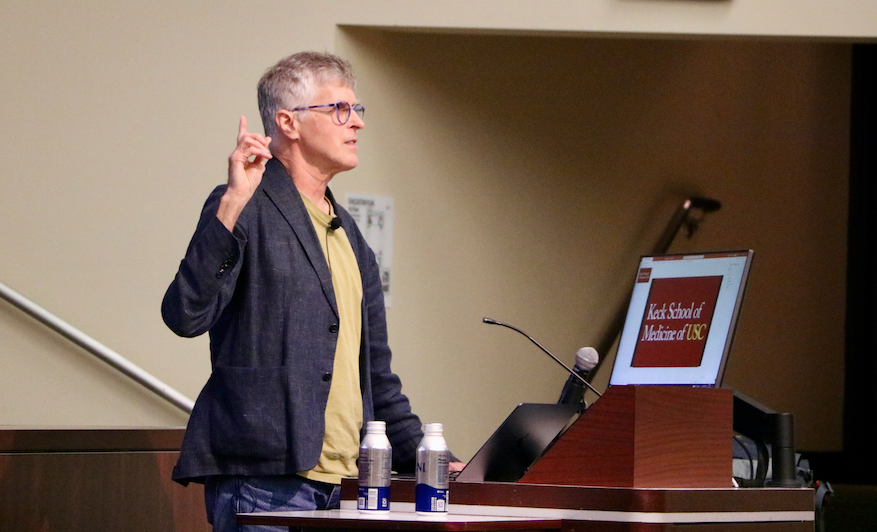Impossible Foods founder talks at HSC

Patrick Brown, the founder of Impossible Foods, presented a lecture at the USC Health Sciences Campus Monday addressing challenges of the meat industry as part of the Dean’s Transformative Lecture Series, a series highlighting individuals that have translated their research into practical applications.
Impossible Foods produces plant-based meat substitutes, including the Impossible Burger and Impossible Chicken Nuggets, that are more sustainable for the environment than traditional animal-based products. Impossible’s products are targeted toward traditional meat eaters and are available at more than 60,000 stores and restaurants around the world.
The food industry is ripe for a transition from its dependence on animals, Brown said. He drew attention to thousands of years where society relied on horses for transportation and carrier pigeons for communication — two practices now largely obsolete. Despite the evolution in these areas, Brown said, the food industry has been slow to embrace change and reduce its reliance on animals.
Brown said shifting away from traditional meat products and toward plant-based products will enable food producers to continually refine and evolve their products.
“Once you step away from this fundamentally limited technology platform, you have control of all these parameters that you can use to make it better and better,” Brown said.
Brown focused his lecture on methods of shifting food production to avoid the challenges that the current animal meat industry is causing the world and its population. Two of these overarching global challenges, he said, include a significant drop in biodiversity and a changing climate.
Brown said the total population of mammals, birds, reptiles, amphibians and fish living on Earth now is, on average, less than a third of the number of those living 50 years ago. The decrease in different animal populations is especially dangerous for farming, as 75% of the world’s crops rely on insects for their pollination and reproduction, he said.
“This is a really urgent problem that is not just huge. We need a drastic, dramatic solution,” Brown said. “We need it at scale. We need it soon.”
Livestock occupies a land area significantly larger than the area used for all the crops that are grown for human consumption, Brown said. Reducing animal product consumption and converting the land area currently dedicated to raising animals back to its natural biomass, he said, can reverse the challenges caused by animal agriculture as the restored ecosystem pulls carbon out of the atmosphere.

One of the ways to spur this transformation is developing meat alternatives, Brown said, which inspired the mission to replace animals in the global food system through the Impossible Foods company.
“In 20 years, animal agriculture will go the way of animal-powered transportation and the carrier pigeon,” Brown said. “It will be in history’s rearview mirror and the ecosystems that keep our planet viable will have a new lease on life.”
The seminar capped off Brown’s day-long visit to USC, where he met with small groups of faculty and students to discuss topics related to his research and technical work, said Sarah Hamm-Alvarez, associate dean for basic and translational science research.
“Brown has obviously turned himself into a meat engineer,” she said. “[He] really epitomizes exactly what we’re trying to do.”
Hamm-Alvarez said there will be upcoming speakers in the lecture series who highlight work in transformational research, including thought leaders who began their careers in academia and later started their own businesses or now work for foundations for change.
Carolyn Meltzer, the dean of the Keck School of Medicine, said Brown had a wide-ranging career, as he also co-founded the Public Library of Science, a nonprofit publisher of open-access journals.
“[The Public Library of Science] has really become a mega journal for releasing accessible and important results of scientific investigation,” Meltzer said, calling Brown’s career “eclectic and very impactful.”
Among other challenges, the changing climate poses a significant threat to the global economy, Brown said, pointing to research by reinsurance company Swiss Re suggesting it will trigger a global economic depression in the coming decades.
“If you see a problem that needs to be solved, and you don’t see it being solved, don’t think it’s someone else’s responsibility,” Brown said in an interview with the Daily Trojan. “It’s your responsibility as much as anyone else.”
Brown said students should not feel restricted in what challenges they seek to take on.
“You’ll be happier and have a bigger impact if you don’t stay in your swim lane,” Brown said. “My favorite kind of problem to take on is one that I don’t know how to solve.”

